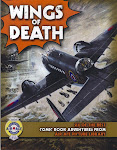G. B. Bertoli?
Our second selection of World of Wonder illustrations includes a feature on the chemical composition of the body. I find this kind of trivia endlessly fascinating and it's absolutely guaranteed to distract me from the job in hand, which is cleaning up the pics for this column. If you want to follow up on how much your body might actually be worth, there are some interesting takes on the subject online. However, don't expact to find a straight answer as it depends on how you add up the costs: the basic chemicals are estimated to cost between under a dollar to just over $160.At the other end of the scale, your body is actually worth more than the sum of its chemical parts because those chemicals are put together in interesting ways and can do very clever things. Wired magazine worked out that the human body could be worth as much as $45 million. Organlegging was science fiction back in the late 1960s when the phrase was invented by Larry Niven. The internet has opened up a market for organ sales and aBay had to incorporate rules over the auctioning of body parts into their terms and conditions as early as 1999. By 2004 the trade in organs was so worrying that the World Health Organisation had to adopt a resolution on the subject.
Anyway, here's what World of Wonder had to say on the subject in 1970, plus a couple of other illustrations from the same issue on rather less controversial topics.
David Nockles
Eric Kincaid
Rudolf Sablic
(* World of Wonder © Look and Learn Ltd.)




























































I always felt that World of Wonder was a rather worthy and more formal version of Look and Learn. L & L was revamped a few times over its 20 year run but there was a lot of fun in it. Stories like Jason January (Space Cadet), Dan Dakota, Rob Riley - firstly schoolboy then sleuth, Beric the Briton.Almost every story seemed to have an alliterative title!
ReplyDelete